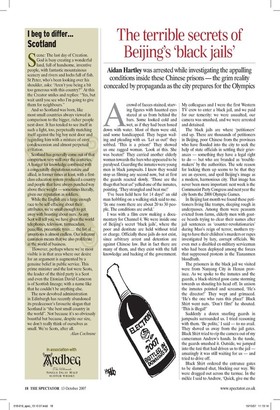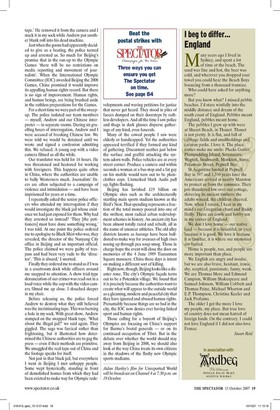The terrible secrets of Beijing's 'black jails'
Aidan Hartley was arrested while investigating the appalling conditions inside these Chinese prisons — the grim reality concealed by propaganda as the city prepares for the Olympics Acrowd of faeces-stained, starving figures with haunted eyes stared at us from behind the bars. Some looked cold and wet, as if they had been hosed down with water. Most of them were old, and some handicapped. They began wailing and pleading with us. 'Let us out!' they sobbed. 'This is a prison!' They showed us one ragged woman. 'Look at this. She was beaten!' They carried another elderly woman towards the bars who appeared to be paralysed. Guarding the inmates were young men in black jumpsuits. I knew they would stop us filming any second now, but at first the guards reacted slowly. 'Those are the thugs that beat us!' yelled one of the inmates, pointing. 'They strangled and beat me!'
'I've been held here for 14 days!' an old man hobbling on a walking stick said to me. 'In one room there are about 20 to 30 people. The conditions are awful.'
I was with a film crew making a documentary for Channel 4. We were inside one of Beijing's secret 'black jails', where the poor and destitute are held without trial or charge. Officially these jails do not exist, since arbitrary arrest and detention are against Chinese law. But in fact there are many of them, and they exist with the full knowledge and backing of the government.
My colleagues and I were the first Western TV crew to enter a black jail, and we paid for our temerity: we were assaulted, our camera was smashed, and we were arrested and detained.
The black jails are where 'petitioners' end up. There are thousands of petitioners in Beijing, poor Chinese from the provinces who have flooded into the city to seek the help of state officials in settling their grievances — something they have a legal right to do — but who are branded as 'troublemakers' by the authorities. The sole reason for locking them up seems to be that they are an eyesore, and spoil Beijing's image as a modern, harmonious city. That image has never been more important: next week is the Communist Party Congress and next year the city hosts the 2008 Olympic Games.
In Beijing last month we found these petitioners living like tramps, sleeping rough in underpasses. Among them were peasants evicted from farms, elderly men with goatee beards trying to clear their names after jail sentences as 'counter-revolutionaries' during Mao's reign of terror, mothers trying to have their children's murders or rapes investigated by lazy, corrupt officials. We even met a disabled ex-military serviceman who had been deployed among the forces that suppressed protests in the Tiananmen bloodbath.
The prisoners in the black jail we visited were from Nanyang City in Henan province. As we spoke to the inmates and the guards, a black-shirted goon came storming towards us shouting his head off. In unison the inmates pointed and screamed, 'He's the director!' They wept and grimaced. 'He's the one who runs this place!' Black Shirt went nuts. 'Don't film!' he shouted. 'This is illegal!'
Suddenly a dozen snarling guards in jumpsuits surrounded us. I tried reasoning with them. 'Be polite,' I said — to no avail. They shoved us away from the jail gates. Black Shirt tried to rip the camera out of my cameraman Andrew's hands. In the tussle, the guards smashed it. Outside, we jumped into the taxi that had driven us to the jail — amazingly it was still waiting for us — and tried to drive off.
Black Shirt ordered the entrance gates to be slammed shut, blocking our way. We were dragged out across the tarmac. In the mêlée I said to Andrew, 'Quick, give me the tape.' He removed it from the camera and I stuck it in my sock while Andrew put another blank roll into his dead machine.
Just when the goons had apparently decided to give us a beating, the police turned up and arrested us. So much for Beijing's promise that in the run-up to the Olympic Games 'there will be no restrictions on media reporting and movement of journalists'. When the International Olympic Committee (IOC) awarded Beijing the 2008 Games, China promised it would improve its appalling human rights record. But there is no sign of improvement. Human rights, and human beings, are being brushed aside in the ruthless preparations for the Games.
For a short time we were part of the sweepup. The police isolated our team members — myself, Andrew and our Chinese interpreter — in separate rooms. During six gruelling hours of interrogation, Andrew and I were accused of breaking Chinese law. We were told we would be detained until we wrote and signed a confession admitting this. We refused. A young cop with a video camera filmed us all the while.
Our translator was held for 16 hours. He was threatened and hectored for working with foreigners. This happens quite often in China, where the authorities are unable to bully Westerners much. Journalists' fixers are often subjected to a campaign of violence and intimidation — and have been imprisoned for years at a time.
I repeatedly asked the senior police officers who attended my interrogation if they would investigate the black jail whose existence we had just exposed for them. Why had they arrested us instead? 'They [the petitioners] must have done something wrong,' I was told. At one point the police ordered me to apologise to Black Shirt who was, they revealed, the director of the Nanyang City office in Beijing and an important official. The police claimed we were guilty of trespass and had been very rude to the 'director'. 'This is absurd,' I snorted.
Finally they ordered me to stand as if I was in a courtroom dock while officers around me snapped to attention. A show trial-type denunciation of our crimes was read out in a loud voice while the cop with the video camera filmed me up close. I slouched deeper in my chair.
Before releasing us, the police forced Andrew to destroy what they still believed was the incriminating tape. This was burning a hole in my sock. With great show, Andrew stamped on the swapped blank tape. 'What about the illegal jail?' we said again. They giggled. The saga was farcical rather than frightening, but it illustrated how determined the Chinese authorities are to gag the press — even if their methods are primitive. We smuggled the real tape out of China and the footage speaks for itself.
Not just in that black jail, but everywhere I went in Beijing I met unhappy people. Some wept hysterically, standing in front of demolished homes from which they had been evicted to make way for Olympic redevelopments and waving petitions for justice that never get heard. They stood in piles of faeces dumped on their doorsteps by ruthless developers. And all the time I saw police and thugs in dark glasses disperse gatherings of any kind, even funerals.
Many of the cowed people I saw were elderly or handicapped. Yet the authorities appeared terrified if they formed any kind of gathering. Discontent seethes just below the surface and graffiti attacking the system adorn walls. Police vehicles are at every street corner. Produce a camera and within seconds a woman at a bus stop and a fat guy on his mobile would turn out to be plainclothes cops. Unmarked black Audis pull up, lights flashing.
Beijing has lavished £19 billion on Olympic sites such as the architecturally startling main sports stadium known as the Bird's Nest. That spending represents a fraction of the total money poured into one of the swiftest, most radical urban redevelopment schemes in history. An ancient city has been almost totally razed and rebuilt, all in the name of amateur athletics. The old alley districts known as hutongs have been bulldozed to make way for avenues of high rises nosing up through pea soup smog. Those in charge hope the event will close the door on memories of the 4 June 1989 Tiananmen Square massacre. China these days is intent on making a different sort of killing.
Right now, though, Beijing looks like a disaster zone. The city's Olympic facade turns out to be a Potemkin village. We found that it is precisely because the authorities want to create what will appear to the outside world as a gleaming, modern and peaceful city that they have ignored and abused human rights. Presumably because things are so bad in the city, the IOC now denies ever having linked sport and human rights.
Those calling for a boycott of Beijing's Olympics are focusing on China's support for Burma's brutal generals — or on its continued occupation of Tibet. But in the debate over whether the world should stay away from Beijing in 2008, we should also look at the way China treats its own citizens in the shadows of the flashy new Olympic sports stadiums.
Aidan Hartley's film for Unreported World will be broadcast on Channel 4 at 7.30 p.m. on 19 October




































































 Previous page
Previous page